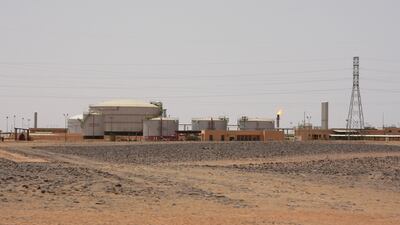Two more oilfields in Libya are being closed after an armed group took over pipelines to both deposits, further disrupting the Opec nation’s plan to boost crude production.
El Feel, or Elephant, stopped production, said Wessam Al Messmari, an office manager for the Petroleum Facilities Guard that is protecting the field. State-run National Oil Corpdeclared force majeure at the deposit, according to a person familiar with the situation who asked not to be identified.
The Hamada oilfield will gradually stop pumping through Monday because of the pipeline closing, said the Arabian Gulf Oil spokesman Omran Al Zwai. Force majeure was also declared on Hamada, he said. Force majeure is a legal clause protecting a party from liability if it cannot fulfil a contract for reasons beyond its control. An armed group closed the pipelines to Hamada and El Feel, according to a person familiar with the situation.
Libya revived its oil production and exports before the recent disruptions. In July, crude production was at a four-year high and exports were the most in three years, according to data compiled by Bloomberg.
_______________
Read more:
Largest oilfield in Libya pumping again
Oil output at biggest Libya field said to plummet
OMV doubles profits and beats forecasts
_______________
While the expansion has helped Libya’s oil-dependent economy, Opec is trying to cut global supplies. That effort has been undermined by recovering output at Opec members Libya and Nigeria.
Libya’s biggest field, Sharara, has been shut for about a week after an armed group closed the pipeline that linked the deposit to an export terminal, Mr Al Messmari said at the time. The field is still not pumping, a person familiar with the matter said.
Libya, which holds Africa’s largest crude reserves, pumped 1.02 million barrels a day in July. It was producing 1.6 million barrels a day before a 2011 revolt set off years of fighting between rival governments and militias.
El Feel is operated by a joint venture between Italy’s Eni and Libya’s NOC. It has an output capacity of 90,000 barrels a day. Sharara, which has a production capacity of 330,000 barrels a day, is run by a joint venture between Libya’s NOC and Repsol, Total, OMV AG and Statoil.

